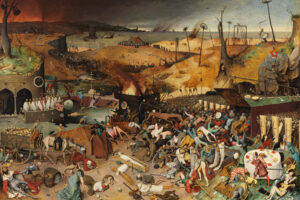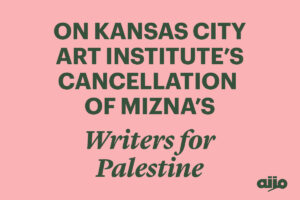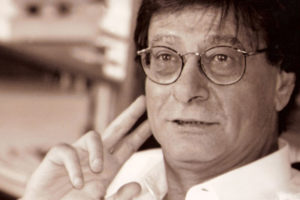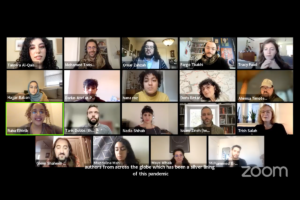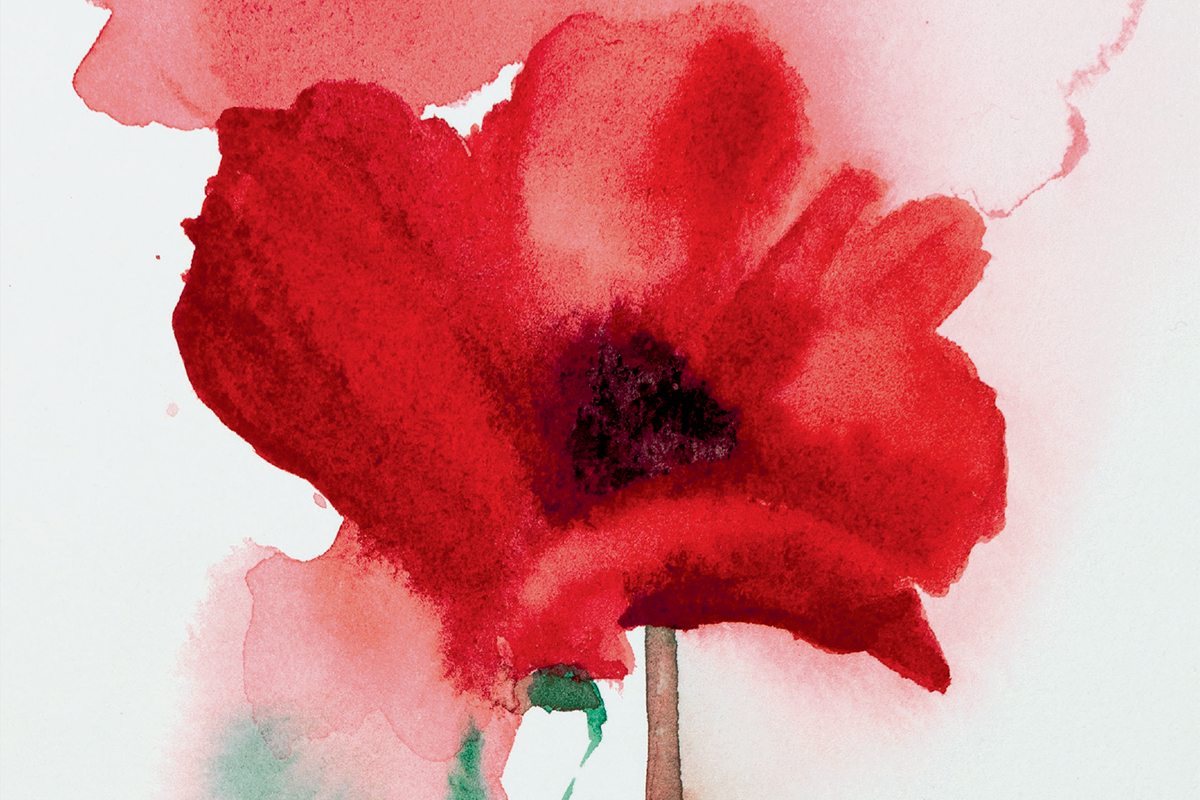
November 4, 2024
Toward an Apocalypse of Letters—Foreword to 25.1: Catastrophe
Executive Editor George Abraham’s introduction to Mizna 25.1: Catastrophe contemplates the work of editing in a time of genocide. Link to order here.
Love takes the form of rain clouds: we accumulate despite our im/possible wounds, gather even in miraculous conditions. We join our kin in the swarm, all of whom gathering, like us, as waters from unknowable sources. And then the flood.
—George Abraham
Toward an Apocalypse of Letters
Challenging the colonial world is not a rational confrontation of viewpoints. It is not a discourse on the universal, but the impassioned claim by the colonized that their world is fundamentally different.
—Frantz Fanon, The Wretched of the Earth
Palestine is not a laboratory. It is not a site of sympathy. It cannot be reduced to a sterile problem. Palestine is a place of abundance, an abundance of lessons about persisting in the looped and looping time of the present . . . There is no postcolonial, postracial, postZionist. We cannot await a secular salvation or a messianic apocalypse. We are in the apocalypse.
—Sherene Seikaly, “Nakba in the Age
of Catastrophe,” Jadaliyya.com
This does not seek a remedy
this does not need a balm
this needs an ending
—Dionne Brand, Nomenclature for the Time Being
What does it mean to edit in a time of genocide, or moreover, a time when the many ongoing colonial catastrophes that underpin our current world order are hypervisible for the communities we claim to serve? The job of the editor, in one view, boils down to keeping the publication machine going. We check in on writers to keep timelines synced toward a publication deadline. We read pieces closely to move them through content editing and copyediting, layout, and proofing with as minimal potential setbacks as possible. A question I have been grappling with over the course of the past eleven months is, how can the material and ideological implications of this job translate to serving a community that is, intentionally, trying to stop this horrific genocidal death machine; a community making art that, as Mizna beloved Rasha Abdulhadi says, can be thrown like sand into the gears of empire? How does one reconcile these opposing orientations in space-time, making room for the long, deep, slow, relational thinking our movements need, while the world accelerates in its insistence on unmaking us?
One answer, of course, is that communally-focused editors can serve as ambassadors, working to break down imperially-imposed barriers for their authors and build possibility-generating avenues during a time of catastrophe. I cannot introduce this issue of Mizna without naming the ways much of its construction was inspired by listening to poets at explicitly pro-Palestinian gatherings: Aurielle Marie’s pieces which came to us after a Poets for Palestine event organized by Claire Schwartz in October 2023; Olivia Elias and Yahya Ashour who came to us from the immense labor of love that went into organizing Palestine Writes in September 2023 against the wishes of one of the wealthiest institutions in the world; the constellation of conversations that emerged from Mizna+RAWIFest 2023.
But this is only part of the answer. How do we reach our people, by which I mean continuously go out of our way to find and welcome our people, in a world whose catastrophes are set on tearing us apart, from our land and from each other, isolating us into silos to make us vessels of pure imperial domination? What is a politics of listening (or the dangerous charades masquerading in the name of listening1) if not backed by an anticolonial politics of rigorously working to break borders as we expand the circle, to accept the infinite unknown implicit to all community-building? In this way, the job of the editor is not merely to be a listener but to be a cultivator of relations: to provide the shelter necessary to keeping each other, let alone each other’s artistry, alive. In this way, I return to the original classical Arabic meaning of the word mizna: a desert cloud that brings needed shelter, perhaps the possibility of rain, in a world insistent on the catastrophe of otherwise.
Having taken on an executive editor position in July 2023, I have, over the past few months, had to learn the beauty and terror of working to build a real-life mizna. At every turn, I have been reminded of just how difficult this position can be. When institutions canceled events with us last-minute because of racist fears of hosting Palestinians in a time like this, I learned and relearned that to be a mizna is to pivot on a moment’s notice, responding to whatever catastrophes the day may bring us. When our insistence on decolonial language and framings were watered down by institutions who cannot see us as more than a “cultural heritage” space, or who cannot tolerate words like “insurgent” or “intifada” or any other gesture toward resistance, I learned that to be a mizna was to embody a kind of collective-oriented sumud: one that knows no other name for future than the collective, the eternal becoming of us as Palestinians and lovers of Palestinians. When, again, board after board of institution after failed settler institution, engaged us in bad faith, gaslit our people, and could not even virtually look us in the eye, I learned that to be a mizna was to be an im/possible wound: to know that many are unwilling to meet us in the depths of our catastrophe, and thus, possibility emerges when confronted by the miracle of finding our people and becoming more radically ourselves together.
This is the ethos I have inherited, from the generations of (predominantly non-male) SWANA artists, editors, laborers, dreamers, and intellectuals who built Mizna. I remember visiting the Mizna office in summer 2023, when our executive director Lana Barkawi filled a box with every single issue the journal has ever published, including our now out-of-print first issue from 1999. As we paged through issue after issue, she recalled the tiniest details: how Ahimsa Timoteo Bodhrán, who graces our pages still today, used the term SWANA in our first issue, decades before it became popularized as a less Eurocentric term for the region; how a flyer from Suheir Hammad’s legendary Poetry for the People reading, presented by Mizna in March 2004 at Open Book in Minneapolis, fell out of a 2003 issue of Mizna, bringing back memories of the packed room that resonate to this day; how the words of contemporary beloveds, from local legends like William Nour to icons such as Naomi Shihab Nye, Susan Muaddi Darraj, and Joe Kadi, consistently appear in our pages, carrying the many trajectories of our writing community through miniature snapshots in time. At every moment, Mizna held the im/possibility of the time in which it was being published, responding to events we now know as history, such as 9/11 and the Arab Spring, and memorializing deceased giants in our community from Edward Said and Mahmoud Darwish to Etel Adnan, in more recent memory. Listening to Lana talk through page after page, I came to understand that this is the nature of our work: love arrives in the attention to even the most minute details. Love takes the form of rain clouds: we accumulate despite our im/possible wounds, gather even in miraculous conditions. We join our kin in the swarm, all of whom gathering, like us, as waters from unknowable sources. And then the flood.
Carrying the entirety of Mizna’s print history, I headed to the airport the next day to board my plane to Chicago, only for the box to set off the TSA scanners. An officer extracted the box of journals from my suitcase before proceeding to inspect every single issue, flipping through every page, testing the surfaces with a chemical swab, and even shaking out some of them to be sure nothing more than the occasional flyer was tucked away in its corners. I didn’t know it, then, but I was, indeed, carrying a weapon that none of us had the capacity of imagining in that moment: I was holding a sheer force that would keep me and many of my loved ones going through the months of genocidal escalation to come, after sustaining itself for such a history for twenty-five years; a force, at once, in/visible to our enemy; a force escaping the margins of imperial terror or colonial anxiety. I was carrying a flood.
* * *
April 2024, seven months of escalating genocide in Gaza. While cowriting EVE with my good friend Fargo Tbakhi at an Arab American National Museum residency, I began venting to him one particularly stressful afternoon. I was juggling our project alongside my editorial work, and more broadly, the work of demanding better from literary institutions in this moment of genocide. Although Gaza deserves our endurance was a running throughline in my head, the burnout was catching up to me. It was the result of months of stalling and bad-faith engagement from the Poetry Foundation, during a boycott that, as I came to see, was popularly supported more out of fear of potential criticism than from a place of actual care for and commitment to Palestinian liberation. At the time, I was also months-deep into conversations with Kundiman’s founders over their (now former) board’s wavering stance on Palestinian liberation—something that, in the months that followed as the Kundiman board proceeded to betray their constituency and fire their ethical staff, I would come to see as a small moment within a broader pattern of bad faith engagement, stalling for self-protection, and downright manipulation of Palestinian generosity. These moments culminated in my venting to Fargo, and eventually my outburst, “Why can’t these people just do their jobs? Why are they so bad at the work they so proudly claim to be doing?” To which Fargo replied something like, “Habibi, you’re having these difficulties and conversations with them precisely because they are doing their jobs.”
At that point, it all clicked for me. What I was witnessing with these institutions, amid the broader landscape of horror stories from academia and literary nonprofit work, was just a microcosm of that terrible fact: this stalling and antirevolutionary manipulation of politically activated writers was these people’s jobs. They had aligned themselves with empire the second they stepped foot into the executive board or foundation or tenure-track or whatever function they played. They had signed an invisible contract with the ruling class to join their project of producing the right kind of literary citizens: writers who know not to bite the hand that feeds them; literary nonprofits (including the many marginalized identity organizations currently wavering on PACBI) engaging in corporatization, political sterilization, and otherwise joining a united front to insist on silence and apathy in the face of imperial genocide; editors who operate with an assumption of scarcity, neoliberal diversity and inclusion politics, and reform-centered ideologies that are deradicalizing in nature. The types that respond to genocide by reposting Darwish quotes and decidedly not by listening to Palestinian demands of our cultural moment and joining the cause. The types who, on one hand, solicit writing from Palestinians and claim to make space for us, knowing full and well they’ve ignored us for the decades when we had less cultural capital to lend them. The types who, on the other hand, can only stomach Palestinians when we are dead but have no ability to support us while we are still living, to say nothing of insisting on our aliveness.
This is the nature of the neocolonized literary citizen: a term I’m using to name the imperial collaborators who, while often not directly employed by colonial governmental administrations (though PEN America’s former CEO and the Poetry Foundation’s former president are disturbing exceptions) are willing accomplices to empire, upholding values that implicitly morph into, and otherwise fail to challenge, imperial lines of power. These values include but are not limited to implicit anti-Palestinian racism, normalization of Zionism and the occupation, and superficial, corporate DEI policies that hide the underlying elite capture of identity politics writ large.
The neocolonized literary citizen is a slant rhyme with what Fanon terms the colonized intellectual in The Wretched of the Earth: the kind that seeks to become the exact colonized elite that the colonialist bourgeoisie seek contact with in moments of potential anticolonial insurgence and liberation.2 The kind that “learned from his masters that the individual must assert himself” and prioritizes individualistic, representational wins at the expense of collective-oriented structural repair.3 The neocolonized literary citizen is the kind of il/literate that finds value in projects like Poets for Harris or Renga for Obama; the kind of liberal that engages in a daily performance of becoming the ideal representation of themselves, and furthermore, works to service, repair, and otherwise maintain the imperial death machine that produces such a regime of neoliberal representation. In other words, they are (often) not the literal CIA, but they’re comfortable uncritically supporting the new DEI-washed faces of the Iowa Writers’ Workshop, the Paris Review, the Stegner program, and other spaces with such histories of statist infiltration and political sanitization.4 They are not literal workers of the political establishment responsible for maintaining the genocides that underpin our current world order but are more than willing to accept material support from, and mold their politics to implicitly service, such regimes. As such, the neocolonized literary citizen ultimately proves to be fundamentally incapable of thinking (or acting) structurally or responsibly.
The problem is im/material. Material, on one hand, in the sense that all money is blood money, and no one, including us at Mizna, can consider themselves exempt from the horrors of the nonprofit industrial complex. It would take an entire essay, or more, to unpack these material implications.5 The problem is also one of imagination—or rather the ways in which these material realities implicitly hinder our imaginative potential. What would it mean for culture workers to orient ourselves not by a politics of scarcity but by one of abundance: to live and embody a praxis that knows the job of the editor, instead of selecting representative literary citizens to uplift, is one of dreaming and building structures capable of holding the sheer mass and magnitude of our people’s brilliance? What if instead of participating in the reproduction of an imperial mentality of hoarding wealth and putting our heads down out of fear of backlash from the ruling class, we engage in the harder work of liberating and redistributing such resources that have been stolen from our communities, in whatever sphere we are able to occupy, however small our impact? In this way, the task of countering an idea of literary citizenship boils down to the question of how capaciously, how im/possibly, we can love our people. Love, understood via Etel Adnan and Franz Fanon, as a kind of violence that destroys world orders and death machines of empire. Love understood in all its impossible hijackings, in all its necessary excess.
Palestinians have shown us this kind of love: in their political actions from the homeland to the diaspora, and also in the ways their literary works join (but do not replace or impede) resistance. Suppose US-based poets were to shed their egos—their allegiance to imperial Craft6 as described by Fargo Tbakhi, their fixations on representational wins. Suppose we were to take inspiration from our kin in Gaza, all of Palestine, and the Palestinian diaspora, instead, who have survived under im/possible conditions beneath the bombs we paid for, at the checkpoints we funded, within institutions whose inclusivity we applaud as they pave over our corpses. What kinds of relations—to each other, to marginalized people in our communities, to the planet we’re actively murdering—might we build toward by taking the lead of the dispossessed as we fight alongside them for liberation? What kind of world is possible if we, as artists and culture workers, model a more responsible listening, a more insurgent response, appropriate to the kinds of catastrophes that underpin our colonial world order? How might we take their lead to build a world where—instead of upholding the normative trend of pitting Sudanese and Palestinian folks against each other in a colonially-mediated audition for empathy, as pointed out by Safia Elhillo7—we are able to unpack the structural entanglements of our shared struggles with rigor and integrity; to say, we cannot fight for a free Palestine without fighting against states like the UAE who are complicit in Sudanese, Gazan, and many other genocides that structure this world order?
The question, again, is one of imagination. How might we better encourage structural-oriented thinking, highlighting the interconnectedness of our movements, instead of selling out to a scarcity myth that people cannot hold more than one struggle in their minds at a given time? Isn’t this the exact imaginative il/literacy that the elite need of neocolonized literary citizens? Suppose our response, instead of isolation, was one of the hard, rigorous, ongoing work of relation-building through catastrophe and editorial work therein. Suppose this was the Nakba that made organizers of us all, academics and editors included? Suppose this Nakba inspired the kind of love that comrades like June Jordan, Etel Adnan, and other radical writers of past generations worked so hard to model for us? Suppose we took seriously the words of Black queer Southern organizer and poet Aurielle Marie who, in a heart-stopping poem that meets Palestinians at the depths of our catastrophe, insists, “don’t you run from me. love me back. let us all be together beneath this green sun.” Suppose we were to finally break the cyclic catastrophes induced by the villanelle that has become of western empire that, as River 瑩瑩 Dandelion reminds us in their poem, will end “only in ashes.” Suppose we were to take seriously the stakes Mohammed Zenia articulates when saying, “in a political poem, you write like a suicide bomber or it’s not political.” How might these poems offer us, if not a balm, a brief ending; if not an answer, the questions that will get us there? What relationalities are waiting for us on the other side of empire?
* * *
The works of this issue, brought to us by gatherings in a time of catastrophe, are but a small portrait of the ways our community embodies the kind of decolonial love that resists the closures and boundings of neocolonized literary citizenship. As the US faces a rising fascist right wing, proudly invoking legal canon that deems Black people subhuman, alongside an increasingly fascist democratic party that dismisses catastrophized Palestinians as just another single issue, this edition of Mizna assembles work insisting that we make catastrophe empire’s urgent issue, and furthermore, models the kinds of relationalities possible beyond the current power configurations plaguing our literary landscape. As PEN America responds to principled writers who boycott them for continued silence on Palestine and a long history of entanglement with the Zionist entity with accusations of flattening nuance or inhibiting free exchanges of ideas, the authors in this issue offer, instead, a lexicon of abundance: the kind of abundance that, in a poem by Alan Semerdjian dedicated to Artsakh, ends in the insistence on Armenian aliveness; the kind of abundance that holds more than thirty years of Arab American history, as Summer Farah does in her epistolary poems to Etel Adnan, in a poem written after our Mizna+RAWIFest gathering in October 2023, where Palestinian love for each other looks like “leena’s hand in mine three days straight”; the kind of abundance capable, as Michael Lawrence Payne has done, of translating poetry from eleventh-century Gazan Palestinian poet, Sulaymān al-Ghazzī, with a grief that’s as heavy, relevant, and instructive today as it was then; the kind of abundance that ties together the geopolitical and intimate scales of catastrophe, as Leila Mansouri has done in her short story “Flashbang.”
Although this issue is heavy with many griefs, especially with Sudanese, Armenian, and Palestinian writers at the center, the process of editing it has reminded us of how we are not alone in this struggle. This issue would not have been possible without our comrades from RAWI, who occupy an unique position in the literary landscape as a grassroots organization building community from the ground up and modeling inclusivity and repair beyond what is capable of literary institutions. Long-time Mizna family, such as Leila Abdelrazaq, Ruba El Melik, leena aboutaleb, Mejdulene Bernard Shomali, and Ahimsa Timoteo Bodhrán, join with many writers making their first appearances in our pages: elder Nakba survivor and Francophone Palestinian poet Olivia Elias, alongside critically acclaimed writers Noor Hindi, Nadia Shammas, mónica teresa ortiz, Danez Smith, and Arthur Kayzakian, alongside Sudanese writer J Omer and Palestinian American Ghazzawi writer Sarah Aziza. Together, with the staff laboring to make this issue and every beloved contributor across the world, we stand in steadfast solidarity with our kin, and everyone around the world resisting the many colonial catastrophes that underpin this world order.
Together, the mizna of this issue is a rare accumulation in today’s literary landscape. The literature of empire will never have what we have between these pages; they will never, truly, know love. They who only know how to murder each other, in and beyond their words, for the sake of that failed love: the kind that only knows names like hoarding and borders, and never abundance, liberation, unboundedness. They who cave to illiterate executive boards, who allow cops to lead their foundations, who make promises to our community that they are incapable of fulfilling because they are incapable of loving anyone, including and especially their own selves.
We will not mince words: the moment we are witnessing is nothing short of apocalypse. And so, in response, we demand nothing short of an apocalypse of letters.
May we gather.
May we swarm.
Then, the flood.
- 1. Fargo Tbakhi, “Being Listened to: On Philip Metres’s Shrapnel Maps, Colonialism, and the Violence of Conversation,” The Poetry Project (Fall 2020). Retrieved from https://www.poetryproject.org/publications/newsletter/262-fall-2020/being-listened-to-on-philip-metres-shrapnel-maps-colonialism-and-the-violence-of-conversation ↩︎
- 2. Frantz Fanon, The Wretched of the Earth (New York: Grove Press, 2005), 9. ↩︎
- 3. Fanon, 11. ↩︎
- 4. For further reading, see Eric Bennett’s Workshops of Empire: Stegner, Engle, and American Creative Writing during the Cold War (Iowa City: University of Iowa Press, 2015), which, amusingly, was published by the University of Iowa Press. ↩︎
- 5. For further reading, see INCITE!’s The Revolution Will Not Be Funded (Durham: Duke University Press, 2017). ↩︎
- 6. See Fargo Nissim Tbakhi’s “Notes on Craft: Writing in the Hour of Genocide” Protean Magazine (December 8, 2023). https://proteanmag.com/2023/12/08/notes-on-craft-writing-in-the-hour-of-genocide/ ↩︎
- 7. Subscribe to safiamafia.substack.com to read Safia Elhillo’s article, “we shouldn’t have to compete for empathy: a war that defies summary, that defies soundbites,” which is also excerpted on her instagram @safiamafia. ↩︎

George Abraham (they/هو) is a Palestinian American poet, essayist, critic, performance artist. Their debut poetry collection Birthright (Button Poetry, 2020) won the Arab American Book Award and was a Lambda Literary Award finalist. They are the executive editor of Mizna, and co-editor of HEAVEN LOOKS LIKE US: Palestinian Poetry (Haymarket Books, 2025). They are a graduate of Northwestern’s Litowitz MFA+MA program, and teach at Amherst College as a Writer-in-Residence.

Toward a Free Palestine: Resources to Learn About and Act for Palestine
We are proud to present this text as part of a list of resources to take action for and learn about Palestine, as well as works by Palestinian artists, writers, activists, and cultural workers.





